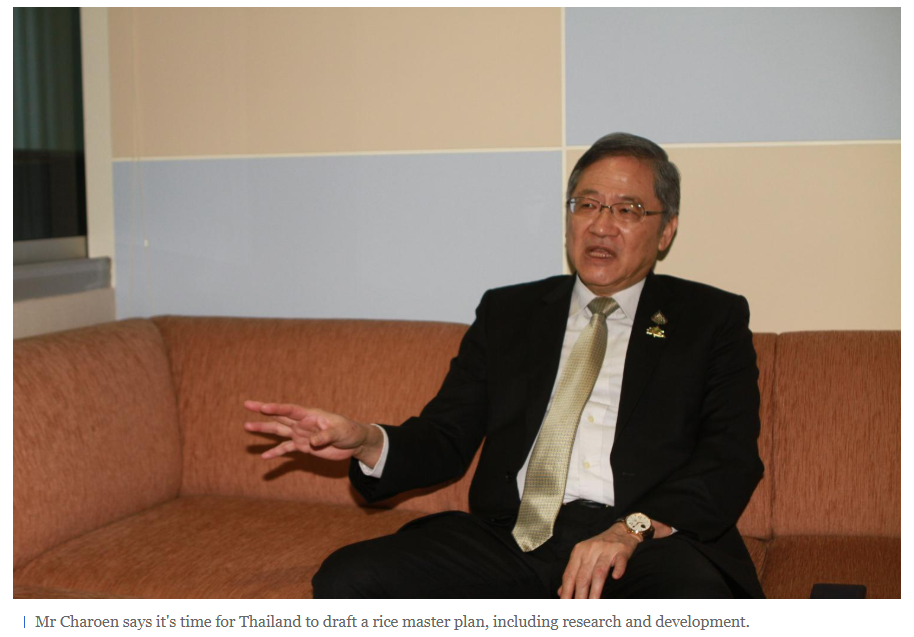Thailand: An accidental trader faces shifting winds
Charoen Laothammatas doesn’t aim too high in life. He lives simply and never had dreams of becoming a trader, especially in rice, a highly political crop with a tendency towards price volatility.
“When I was young I wanted to be a doctor, but I didn’t have a chance to pursue studies in that field,” says the president of the Thai Rice Exporters Association, 69. “In the old Chinese family, children had to strictly obey the father’s instructions with no questions. My father ordered me to become a trader, so I did.”
Born in Lampang province in the North as the fourth child of a family that ran premium rice mills in Chiang Rai, young Charoen was sent by his father to study at a Chinese school in Bangkok when he was five years old.
He studied there until Grade 4, when the school was closed during the period Thailand was fighting a communist insurgency. His father sent him to a boarding school in Hong Kong for nine years.
“My father thought I would learn Chinese knowledge from Chinese people in Hong Kong and this would create trade convenience in the future for me,” Mr Charoen says.
After secondary school graduation in Hong Kong, his father sent him to the US to earn his bachelor’s and master’s degrees.
After earning a Master of Business Administration, he returned to Thailand in 1976 and applied to the International Criminal Police Organization, widely known as Interpol, which was looking for staffers fluent in Chinese and English.
Mr Charoen worked as an Interpol officer in the Foreign Affairs Division of the Royal Thai Police. He left his police career in 1982 to help run his family’s rice mill business during a period of intensifying competition as better land transport led millers in the central region to set up mills in Chiang Rai.
“We had to shift to rice exports and have engaged in rice exports ever since,” Mr Charoen says. The family set up Uthai Produce as a rice export company in 1982, starting with just 3 million baht and without its own warehouse.
The company at first focused on jasmine fragrant rice shipped to Macao and Shenzhen in China under the Golden Wheel brand to capitalise on China’s economic reform and reopening policy. Then the US market began clamouring for quality grains.
“I feel a bit lucky that I’ve never encountered any crisis,” Mr Charoen says. “Most of our regular customers are good people with a long-term relationship because their businesses grew up together with our company. The success of trading needs luck and sincerity.
“Give sincerity to all customers. Don’t take advantage of them, they will then become your long-term customers. Our customers have been trading with us for 20-30 years, and we know one another well. I have two children, a daughter and a son. My daughter likes politics and is now a member of parliament. I always teach her to be honest and not to take advantage of people and do her best for the nation.”
In his view, it’s quite risky to do business with new customers because rice trading depends on forward selling and coming up with credit terms. Thai rice exports are tough lately because of stiffer competition and credit term requirements.
“Honestly speaking, the rice export industry is unlikely to be very successful in the future as it becomes a political crop, making us unable to control all supply chains,” Mr Charoen says. “We will be able to maintain our business as long as the government intervenes less in the rice market. More importantly, we would like to see a more stable government which stays long enough to tackle various and cumulative problems that can’t be solved in the short term.
“Our governments change every 1-2 years. This is the obstacle to implementing long-term measures and policies such as solutions to increase rice competitiveness. State-sponsored rice-pledging or rice price guarantees are just temporary measures. The Thai rice industry’s prospects look gloomy.”
He says it’s time for Thailand to draft a rice master plan, including research and development in response to market demand. Rice R&D in Thailand has moved at a snail’s pace relative to other rice producers like Vietnam.
Mr Charoen suggests the government turn attention to the development of rice seeds to boost the country’s competitiveness and exports. He says the government should promote more soft-textured rice seeds instead of the hard-textured ones pushed now.
According to Mr Charoen, Thailand’s rice industry has lacked for development of rice varieties in the past decade, with exports relying heavily on three grains: white rice, hom mali rice and glutinous rice.
“We need to understand that 50% of total rice production is slated for export,” he says. “If we can export more rice, the domestic rice price will improve accordingly.”
BIO DATA
Charoen Laothammatas
Age: 69
EDUCATION
– BA, Brigham Young University
– MBA, University of Southern California
CAREER
– 1983-present: Chief executive, Uthai Produce Co
– 1978-82: Interpol officer, Royal Thai Police
HOBBIES
– Exercise, watching feature films and TV series
Source: https://www.bangkokpost.com/business/1911472/an-accidental-trader-faces-shifting-winds


 English
English





